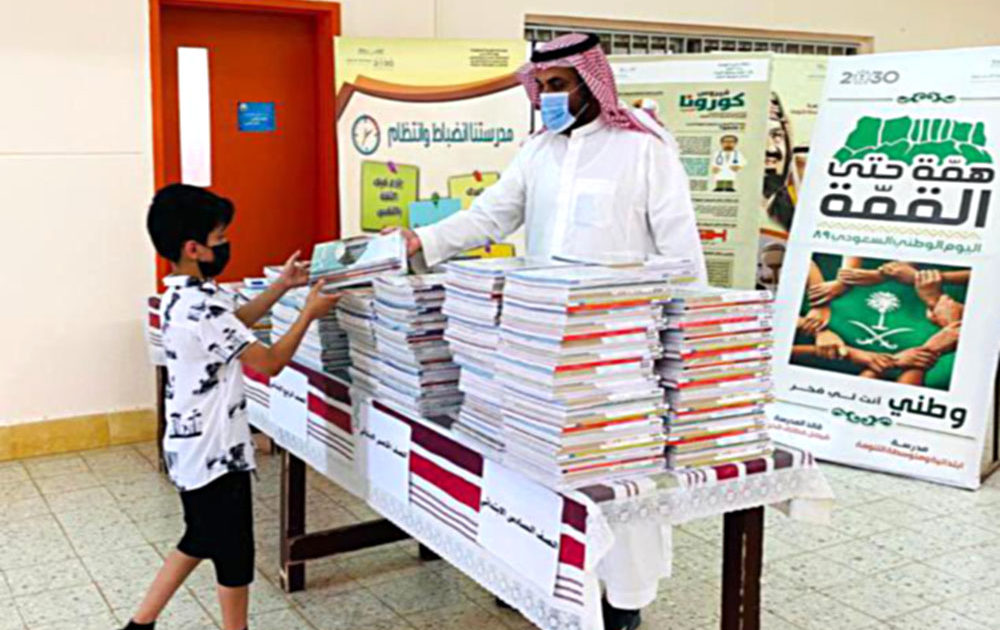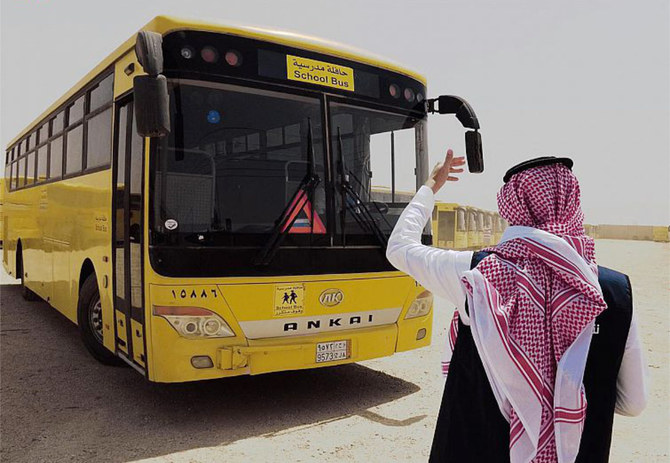JEDDAH: Saudi students kept away from the classroom for more than 18 months due to the global pandemic are looking forward to heading back to school in a new post-COVID-19 setting.
On March 8, 2020, the Kingdom’s Ministry of Education suspended school attendance to help combat the spread of the coronavirus. Students immediately switched to online classes — a new experience that had a profound impact on the way many approached their studies, with some struggling to adapt to the dramatic change.
Only university students were able to benefit from face-to-face teaching and allowed to take their final exams amid strict health measures to curb the spread of the virus.
But with the pandemic easing, high school and middle school students are heading back to school on Aug. 29, book bags and lunch boxes in tow — and with masks and packets of sanitizers as new additions to their school requirements.
FASTFACT
With the pandemic easing, high school and middle school students are heading back to school on Aug. 29, book bags and lunch boxes in tow — and with masks and packets of sanitizers as new additions to their school requirements.
For many, excited to see their classmates and teachers in person again, the resumption of normal school life will be a relief.
But the return to the classroom comes with a price: Only students who have received both vaccine doses or recovered from a COVID-19 infection and received one jab can go back to school.
Students in elementary and preschool will not be allowed to return until herd immunity of 70 percent has been acquired through completion of doses or full immunization.
The health ministry has taken steps to ensure protection of students’ health is a top priority, while also safeguarding educational advancement.
With “No child left behind” as the ministry’s unofficial motto, authorities have worked together to make it easier for parents to register their children for the COVID-19 vaccine, and for school administrators to track and view data, including health, vaccination and infection status for students and staff, through the Tawakkalna app.
The app’s “we are learning with caution” section shows details such as the number of students and staff who have come into contact with infected individuals, the number of infected people and the number of those immunized.
Arab News spoke to several students who shared their excitement at going back to school and their struggles with distance learning.
Nad Saud Al-Quwaidi, 17, said that during the three semesters away from the classroom “information was not delivered sometimes and it was difficult to understand certain things from a distance. The Internet or sound would cut off sometimes, too.”
She added: “I miss school and my friends, and I’m excited to be going back to see my teachers. I even miss the school routine. I like to get up early, put on my school uniform, and prepare my bag and breakfast. But with distance education, I used to get lazy and was late sometimes.”
Dana Nadeem, a 14-year-old middle schooler, said that it will be “a strange experience” to go back to school life after 18 months away.
“I missed it a bit, but not as much as I expected. It’s a weird feeling going back. I’m trying to remember how life was before the pandemic, and I am looking forward to seeing my teachers and classmates again,” she said.
“I did miss preparing my bag the night before and reviewing my schedule, but I can’t say the same about wearing the uniform.”
Mohsin Ghazi, 13, said that homework, group tasks and communication were a struggle while away from school.
“At first it was hard sending the homework and communicating with my teacher from a distance. Teamwork was also challenging, especially communicating with my class team-mates,” he said.
Ghazi said that he missed his social life at school the most. “I missed hanging out with my friends during break time.”
His older sister Maha said that it is important to have an environment for learning as it reduces distractions.
“Not being in school was slightly distracting. I could understand online lessons, but it was easier when we had face-to-face meetings with peers and teachers,” she said.
Face-to-face interactions help with learning and the social aspect plays an important role in education, she added.
“Human interaction is a part of the education process,” she said. “Returning to school with new rules due to COVID-19 restrictions won’t be easy; I don’t think school will go back to normal due to social distancing.”
She added: “One thing I’m sure of is that I did not miss waking at 6 a.m. every morning.”
Maha understands that social distancing and masks will be mandatory. “However, during break time, I assume a handful of students will be sitting in groups if they have the chance. Surely for every five people, sanitizers will be our sixth groupie.”





























